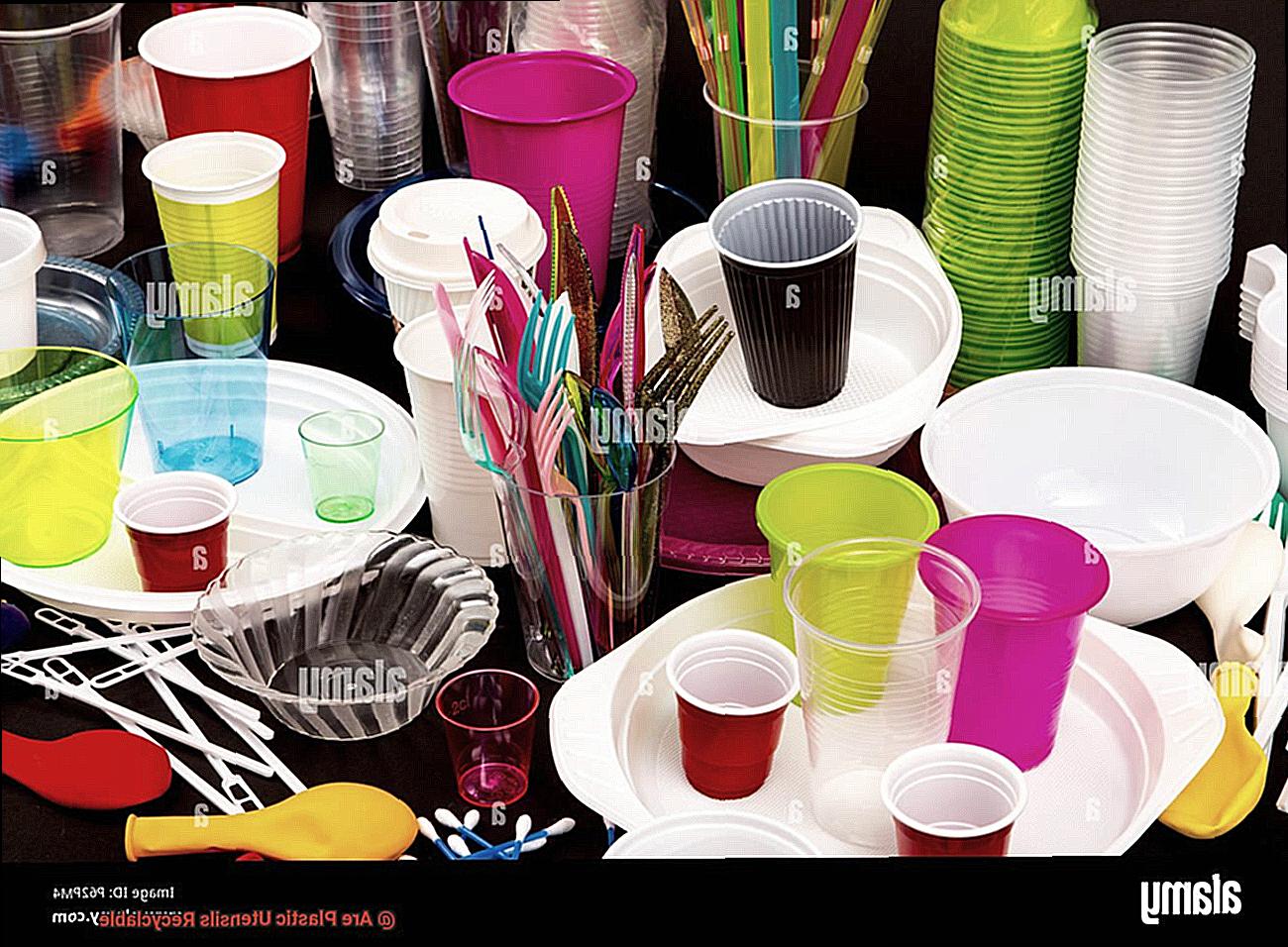Plastic utensils are everywhere – in our kitchens, offices, and restaurants.
They’re convenient and disposable, making them a popular choice for many. But what happens when we’re done with them?
Can plastic utensils be recycled? It’s a question that’s been on many people’s minds, but the answer isn’t as simple as you might think.
Recycling is important for reducing our environmental impact, but recycling plastic isn’t always straightforward. Plastic is a complex material with different types requiring different processes to be recycled properly.
In this blog post, we’ll dive into the world of plastic utensils and explore their recyclability. We’ll take a closer look at the various types of plastic used to make utensils and the challenges of recycling them.
We’ll also examine the environmental impacts of plastic utensils, including their harm to marine life and contribution to pollution. But it’s not all doom and gloom.
So let’s jump in now.
What Kind of Plastics are Used to Make Plastic Utensils?
Contents
- 1 What Kind of Plastics are Used to Make Plastic Utensils?
- 2 Do Recycling Centers Accept Polystyrene?
- 3 What is the State and City Regulations on Recycling Plastic Utensils?
- 4 Is it Feasible to Recycle Plastic Utensils in Your Area?
- 5 How Can You Avoid Using Plastic Utensils Altogether?
- 6 What Alternatives Can You Use Instead of Plastic Utensils?
- 7 Conclusion
Plastic utensils are widely used across the globe, from takeout meals to picnics and other gatherings.
However, one question that lingers in our minds is whether plastic utensils are recyclable or not. Let’s dive into it.
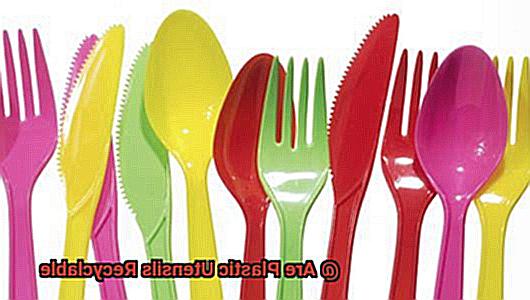
Polystyrene is the most commonly used plastic for making utensils due to its low cost and durability. It is a lightweight and rigid material that can be easily molded into different shapes.
However, polystyrene is almost impossible to recycle due to its composition, and recycling centers do not accept it as it is not cost-effective. This means that most plastic utensils end up in landfills where they can take hundreds of years to decompose.
Polypropylene is another type of plastic that is widely used for creating plastic utensils. It is a strong and heat-resistant material that can withstand high temperatures, making it ideal for use in hot food and beverage containers.
Polypropylene utensils are also microwave safe and can be reused multiple times. However, unlike polystyrene, polypropylene is not widely present in recycling plants.
Polycarbonate is a high-performance plastic that is used for making durable and shatter-proof utensils. It is a thermoplastic material that can withstand high impacts without breaking or cracking, which makes it the go-to choice for commercial settings such as restaurants and hotels.
It’s important to note that not all types of plastics are recyclable. While some plastic utensils can be recycled, others cannot due to their composition or contamination with food waste.
Most recycling facilities only accept clean and uncontaminated plastics, which means that plastic utensils must be thoroughly cleaned before they can be recycled. In conclusion, plastic utensils are made from various types of plastic materials, including polystyrene, polypropylene, and polycarbonate.
Although recycling plastic utensils may prove challenging, as they are only accepted by specific recycling centers, we can still make a difference by reducing our reliance on single-use items and opting for reusable or compostable alternatives.
Do Recycling Centers Accept Polystyrene?
Polystyrene, the lightweight material used to make disposable utensils, poses a challenge for recycling centers due to its bulkiness and low weight.
However, there is still hope as some recycling centers accept polystyrene, but it must be free of any food or other contaminants. If recycling is not an option, there are alternative ways to dispose of polystyrene utensils.
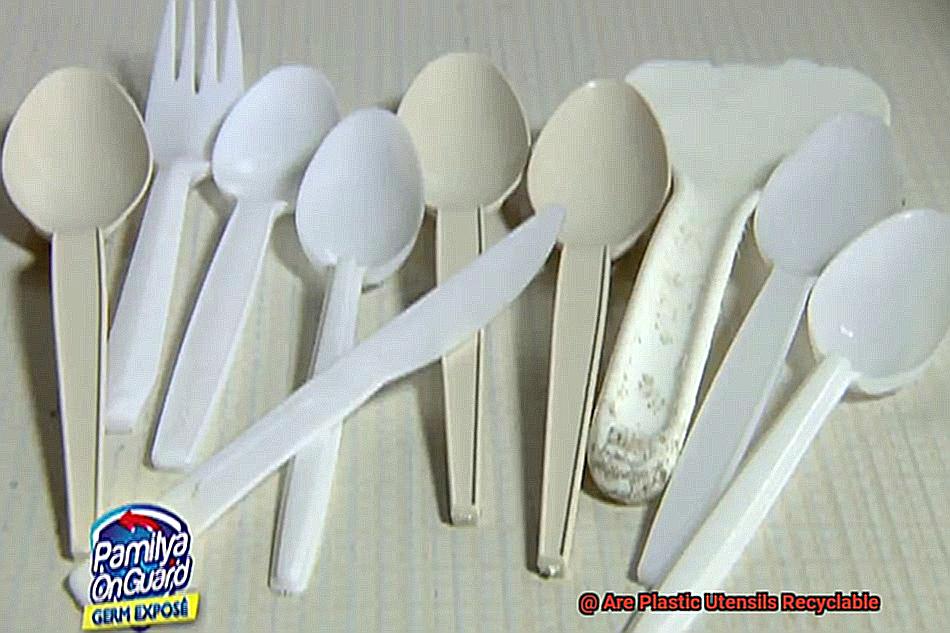
Consider donating them to charitable organizations such as shelters or soup kitchens to reduce waste and provide much-needed resources for those in need. But let’s not forget the importance of reducing our use of single-use plastics altogether.
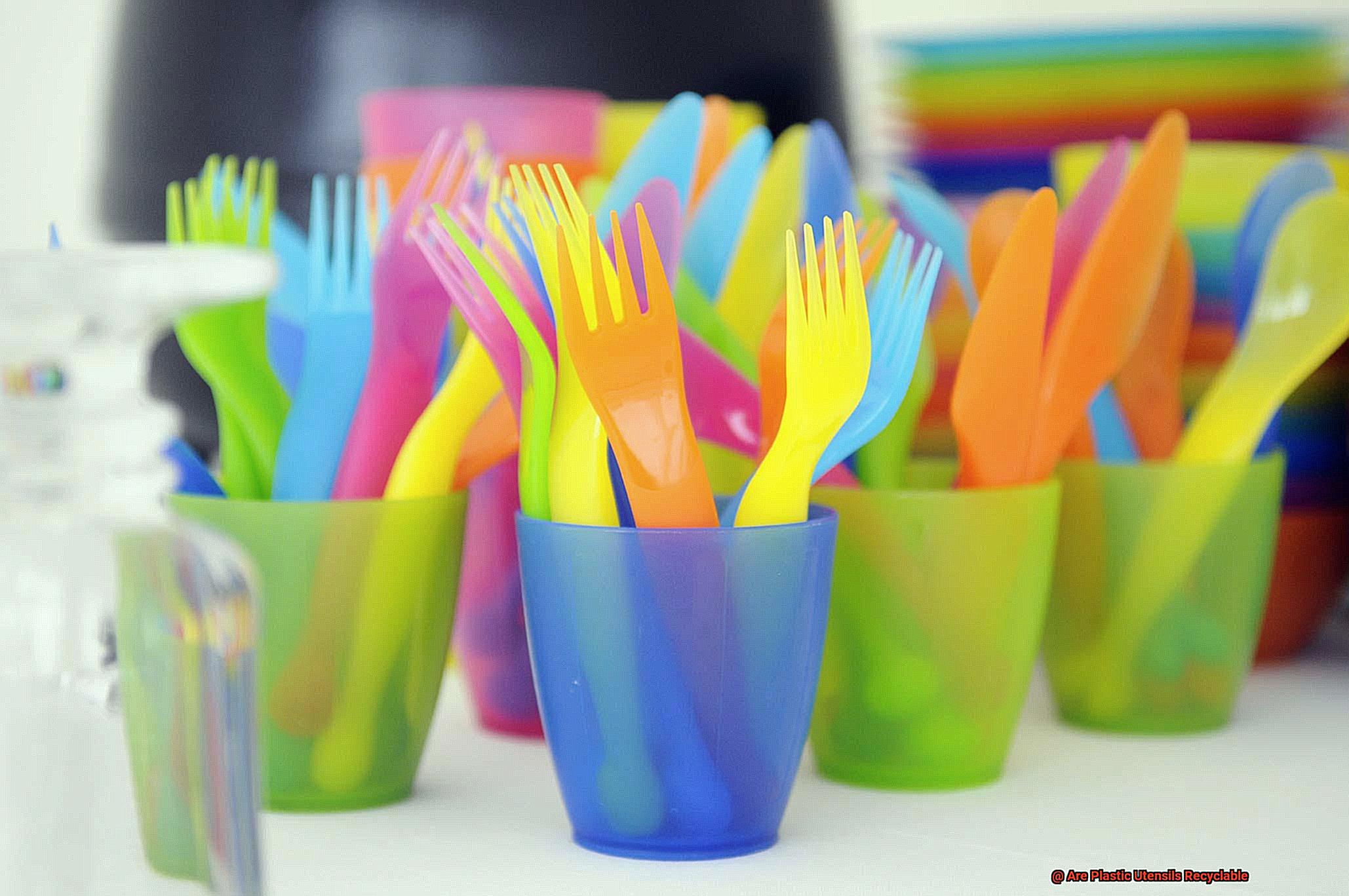
Switching to reusable utensils and containers made from more easily recyclable materials such as paper or metal can significantly reduce plastic waste. In conclusion, although polystyrene may not be the most convenient material to recycle, there are still options for proper disposal.
Remember that every small step we take towards reducing our plastic consumption can make a significant impact on preserving our planet for future generations.
What is the State and City Regulations on Recycling Plastic Utensils?
While plastic utensils are generally not accepted in curbside recycling programs because they are typically made from a type of plastic that is not easily recyclable, some cities and states have specific regulations or guidelines for recycling them. For instance, if you live in New York City, plastic utensils are not accepted in the curbside recycling program.
But don’t worry. You can still make a difference.
Residents are encouraged to reduce their use of single-use plastics, including plastic utensils, and dispose of them properly in the trash. But did you know that some businesses may be able to recycle plastic utensils through a private waste hauling service?
That’s another way to do your part. If you’re on the West Coast, Los Angeles does not accept plastic utensils in their curbside recycling program either.
However, some recycling centers may accept them if they are clean and dry. So it’s always important to check with your local recycling center to see what they accept and what their specific guidelines are.
It’s important to remember that just because a plastic item has a recycling symbol on it doesn’t mean it can be recycled in your curbside program. Always check with your local recycling guidelines to see what can and cannot be recycled in your area.
If you have a pile of plastic utensils that you need to get rid of, there are still things you can do to make a difference. For example, you could donate them to charities or switch to reusable utensils made from more easily recyclable materials.
Is it Feasible to Recycle Plastic Utensils in Your Area?
The answer isn’t always straightforward, as it depends on where you live and what type of plastic the utensils are made from.
But don’t worry, I’m here to guide you through this confusing topic. The main reason plastic utensils are not easily recyclable in most curbside recycling programs is due to their small size and the challenge of separating them from other recyclable materials.
This means that many recycling plants lack the necessary equipment or resources to process them properly. However, there are still options available for those who want to dispose of their plastic utensils correctly.
You can start by checking with your local recycling center or waste management facility to see if they accept plastic utensils for recycling. Some facilities may have special programs or equipment that allow them to recycle these items, so it’s always worth asking.
If there are no recycling options available in your area, another alternative is to donate unused plastic utensils to local organizations or charities. Many schools, community centers, and shelters would value donations of plastic utensils for use in their kitchens or dining areas, reducing waste and supporting community initiatives.
It’s also important to note that not all plastic utensils are created equal when it comes to recyclability. For instance, plastics like polystyrene (commonly known as Styrofoam) are not widely accepted in recycling programs and can take hundreds of years to break down in landfills.
While recycling plastic utensils in your area may not always be feasible, it’s essential to explore all options available and make informed decisions about proper disposal.
How Can You Avoid Using Plastic Utensils Altogether?
These seemingly insignificant items are actually major contributors to plastic pollution, but avoiding them altogether is easier than you might think. First and foremost, bring your own utensils from home.
Whether it’s metal, bamboo, or biodegradable, having your own utensils in your bag or purse not only reduces waste, but also saves you money. Plus, you can choose utensils that match your needs and personal style.
It’s a win-win situation. Another simple way to reduce the use of plastic utensils is to use washable ones.
Instead of reaching for disposable plastic utensils, try using washable ones that can be reused many times. Not only will this significantly reduce the amount of plastic waste generated, but washable utensils are also more durable and reliable than their disposable counterparts.
When it comes time to replace your old utensils, consider eco-friendly alternatives such as bamboo or stainless steel. These materials are sustainable, long-lasting, and can be used for years to come.
And don’t forget about saying “no” to plastic straws when ordering a drink – opt for a reusable straw made of metal or bamboo instead. Lastly, if you must use disposable utensils, choose compostable ones made from plant-based materials like cornstarch or sugarcane.
These materials break down easily and don’t harm the environment like traditional plastic utensils do. By following these simple steps, you can significantly reduce the amount of plastic waste generated by utensils and contribute to a cleaner and greener planet.
What Alternatives Can You Use Instead of Plastic Utensils?
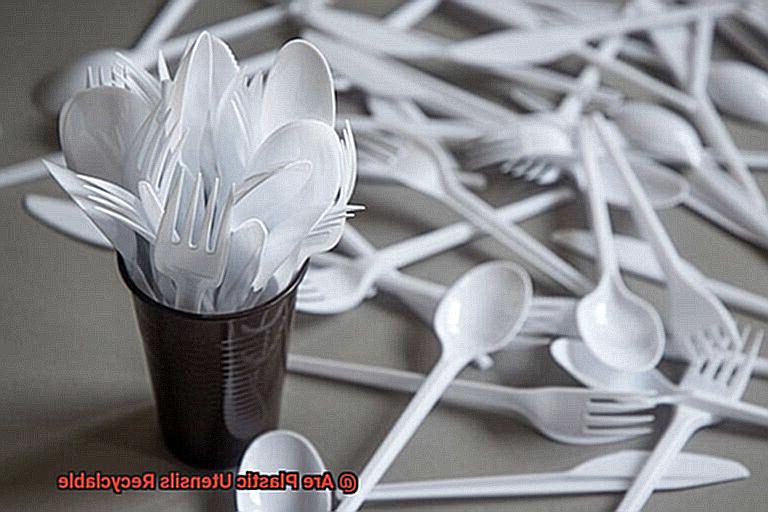
Plastic utensils may be convenient, but their negative impact on the environment is undeniable.
Are you ready to make a change and explore alternatives that are eco-friendly and sustainable? Look no further.
Here are some great options to try: Reusable Utensils: Say goodbye to single-use plastic utensils and say hello to reusable ones made of bamboo, stainless steel, or wood.
These utensils are not only strong and lightweight, but they’re also simple to clean, making them perfect for on-the-go dining or picnics. Not to mention, you’ll save money in the long run by not having to purchase new utensils every time.
Compostable Utensils: If you prefer disposable utensils, choose compostable ones made from cornstarch, sugarcane, or wheat straw. These materials are biodegradable and can be composted after use, minimizing the volume of garbage sent to landfills.
However, it’s important to ensure that they’re properly disposed of in a commercial composting facility. Take Your Own Utensils: Another easy alternative is to bring your own silverware from home when dining out or ordering takeout.
This small change can make a big difference in reducing plastic pollution. Reduce Overall Usage: In addition to using alternative utensils, it’s crucial to consider lowering the overall usage of disposable utensils.
For takeout meals, use your own containers or choose restaurants that use biodegradable or compostable utensils. Every small step toward sustainability counts in the fight against plastic pollution.
In conclusion, there are many eco-friendly alternatives to plastic utensils available that can make a significant impact on the environment. Whether you choose reusable utensils, compostable ones, or simply bring your own silverware from home, every action helps create a cleaner and healthier climate.
c8aVYb-a7Uw” >
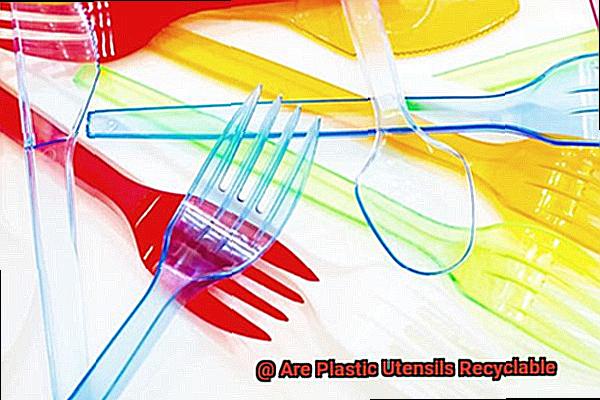
Conclusion
In conclusion, plastic utensils are a common sight in our daily lives, but their recyclability is not as straightforward as we might think.
These utensils are made from different types of plastic, with polystyrene being the most commonly used due to its low cost and flexibility. However, recycling centers do not accept it because it is not cost-effective, and this has created reluctance among recycling centers to accept it.
Additionally, polypropylene and polycarbonate plastics also pose a challenge for proper disposal. But don’t despair.
We can still make a positive impact by reducing our reliance on single-use products and choosing reusable or compostable options instead. Imagine switching to reusable utensils made from more easily recyclable materials like paper or metal?
Or why not bring your own utensils from home when dining out or ordering takeout? It’s worth noting that just because a plastic item has a recycling symbol on it doesn’t mean it will be recycled in your curbside scheme.
Every small step toward sustainability counts in the fight against plastic pollution.
